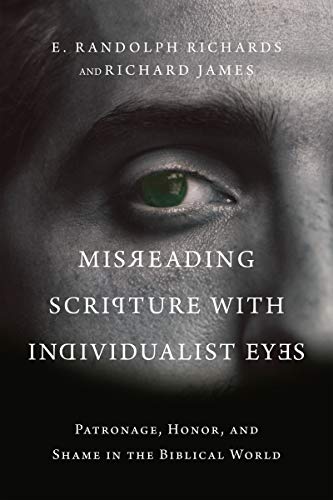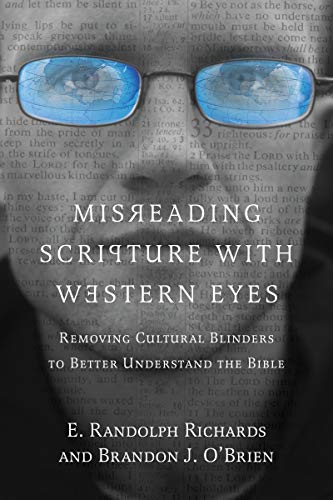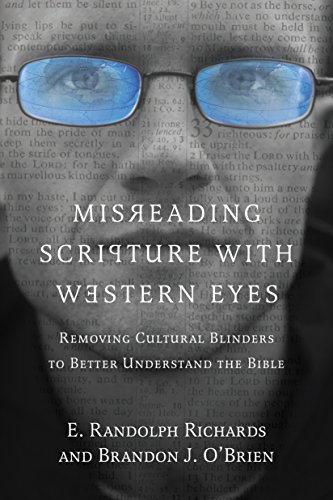Join our list
Subscribe to our mailing list and get interesting stuff and updates to your email inbox.

Author(s): E. Randolph Richards and Richard James
Publisher: IVP Academic
Price: $6.99 (Ends Apr 30)
The Bible was written within collectivist cultures. When Westerners, immersed in individualism, read the Bible, it’s easy to misinterpret important elements—or miss them altogether. In any culture, the most important things usually go without being said. So to read Scripture well we benefit when we uncover the unspoken social structures and values of its world. We need to recalibrate our vision.
Combining the expertise of a biblical scholar and a missionary practitioner, Misreading Scripture with Individualist Eyes is an essential guidebook to the cultural background of the Bible and how it should inform our reading. E. Randolph Richards and Richard James explore deep social structures of the ancient Mediterranean—kinship, patronage, and brokerage—along with their key social tools—honor, shame, and boundaries—that the biblical authors lived in and lie below the surface of each text. From Abraham, Sarah, and Hagar to Peter’s instructions to elders, the authors strip away individualist assumptions and bring the world of the biblical writers to life.
Expanding on the popular Misreading Scripture with Western Eyes, this book makes clear how understanding collectivism will help us better understand the Bible, which in turn will help us live more faithfully in an increasingly globalized world.

Author(s): E. Randolph Richards and Brandon J. O’Brien
Publisher: IVP
Price: $3.99 (Ends Apr 30)
Over 100,000 Copies Sold Worldwide!
Understand Scripture on Its Own Terms
What was clear to the original readers of Scripture is not always clear to us. Because of the cultural distance between the biblical world and our contemporary setting, we often bring modern Western biases to the text. For example:
When Western readers hear Paul exhorting women to “dress modestly,” we automatically think in terms of sexual modesty. But most women in that culture would never wear racy clothing. The context suggests that Paul is likely more concerned about economic modesty—that Christian women not flaunt their wealth through expensive clothes, braided hair and gold jewelry.
Some readers might assume that Moses married “below himself” because his wife was a dark-skinned Cushite. Actually, Hebrews were the slave race, not the Cushites, who were highly respected. Aaron and Miriam probably thought Moses was being presumptuous by marrying “above himself.”
Western individualism leads us to assume that Mary and Joseph traveled alone to Bethlehem. What went without saying was that they were likely accompanied by a large entourage of extended family.
Biblical scholars Brandon O’Brien and Randy Richards shed light on the ways that Western readers often misunderstand the cultural dynamics of the Bible. They identify nine key areas where modern Westerners have significantly different assumptions about what might be going on in a text. Drawing on their own crosscultural experience in global mission, O’Brien and Richards show how better self-awareness and understanding of cultural differences in language, time and social mores allow us to see the Bible in fresh and unexpected ways.
Getting beyond our own cultural assumptions is increasingly important for being Christians in our interconnected and globalized world. Learn to read Scripture as a member of the global body of Christ.

Author(s): E. Randolph Richards & Richard James
Publisher: IVP Academic
Price: $2.99
The Bible was written within collectivist cultures. When Westerners, immersed in individualism, read the Bible, it’s easy to misinterpret important elements―or miss them altogether. In any culture, the most important things usually go without being said. So to read Scripture well we benefit when we uncover the unspoken social structures and values of its world. We need to recalibrate our vision.
Combining the expertise of a biblical scholar and a missionary practitioner, Misreading Scripture with Individualist Eyes is an essential guidebook to the cultural background of the Bible and how it should inform our reading. E. Randolph Richards and Richard James explore deep social structures of the ancient Mediterranean―kinship, patronage, and brokerage―along with their key social tools―honor, shame, and boundaries―that the biblical authors lived in and lie below the surface of each text. From Abraham, Sarah, and Hagar to Peter’s instructions to elders, the authors strip away individualist assumptions and bring the world of the biblical writers to life.
Expanding on the popular Misreading Scripture with Western Eyes, this book makes clear how understanding collectivism will help us better understand the Bible, which in turn will help us live more faithfully in an increasingly globalized world.

Author(s): E. Randolph Richards & Brandon J. O’Brien
Publisher: Intervarsity Press
Price: $2.99
Bookwi.se’s Favorite Books of the Year, Non-Fiction
What was clear to the original readers of Scripture is not always clear to us. Because of the cultural distance between the biblical world and our contemporary setting, we often bring modern Western biases to the text. For example:
When Western readers hear Paul exhorting women to “dress modestly,” we automatically think in terms of sexual modesty. But most women in that culture would never wear racy clothing. The context suggests that Paul is likely more concerned about economic modesty–that Christian women not flaunt their wealth through expensive clothes, braided hair and gold jewelry.
Some readers might assume that Moses married “below himself” because his wife was a dark-skinned Cushite. Actually, Hebrews were the slave race, not the Cushites, who were highly respected. Aaron and Miriam probably thought Moses was being presumptuous by marrying “above himself.”
Western individualism leads us to assume that Mary and Joseph traveled alone to Bethlehem. What went without saying was that they were likely accompanied by a large entourage of extended family.
Biblical scholars Brandon O’Brien and Randy Richards shed light on the ways that Western readers often misunderstand the cultural dynamics of the Bible. They identify nine key areas where modern Westerners have significantly different assumptions about what might be going on in a text. Drawing on their own crosscultural experience in global mission, O’Brien and Richards show how better self-awareness and understanding of cultural differences in language, time and social mores allow us to see the Bible in fresh and unexpected ways.
Getting beyond our own cultural assumptions is increasingly important for being Christians in our interconnected and globalized world. Learn to read Scripture as a member of the global body of Christ.
In this grab bag, we have 11 e-books on “How to Read the Bible” from Intervarsity Press. The prices and sale dates that they have provided are under each book cover.
[table “5679” not found /]
 Author(s): E. Randolph Richards & Brandon J. O’Brien
Author(s): E. Randolph Richards & Brandon J. O’BrienPublisher: Intervarsity Press
Price: $2.99 (Apr 18-19)
Bookwi.se’s Favorite Books of the Year, Non-Fiction
What was clear to the original readers of Scripture is not always clear to us. Because of the cultural distance between the biblical world and our contemporary setting, we often bring modern Western biases to the text. For example:
When Western readers hear Paul exhorting women to “dress modestly,” we automatically think in terms of sexual modesty. But most women in that culture would never wear racy clothing. The context suggests that Paul is likely more concerned about economic modesty–that Christian women do not flaunt their wealth through expensive clothes, braided hair and gold jewelry.
Some readers might assume that Moses married “below himself” because his wife was a dark-skinned Cushite. Actually, Hebrews were the slave race, not the Cushites, who were highly respected. Aaron and Miriam probably thought Moses was being presumptuous by marrying “above himself.”
Western individualism leads us to assume that Mary and Joseph traveled alone to Bethlehem. What went without saying was that they were likely accompanied by a large entourage of extended family.
Biblical scholars Brandon O’Brien and Randy Richards shed light on the ways that Western readers often misunderstand the cultural dynamics of the Bible. They identify nine key areas where modern Westerners have significantly different assumptions about what might be going on in a text. Drawing on their own cross-cultural experience in global mission, O’Brien and Richards show how better self-awareness and understanding of cultural differences in language, time and social mores allow us to see the Bible in fresh and unexpected ways.
Getting beyond our own cultural assumptions is increasingly important for being Christians in our interconnected and globalized world. Learn to read Scripture as a member of the global body of Christ.
Gospel e-books is working together with Christian publishers to allow you to choose what e-books you’d like to have discounted. Cast your vote below and the book with the most votes in each poll will be placed on sale soon after. If there are less than 100 total votes in a particular poll, the winning book will not be discounted.
Book details:
Kregel: Like a River from Its Course by Kelli Stuart (vs.) Lethal Harvest by William Cutrer &, Sandra Glahn
Crossway: Spurgeon on the Christian Life: Alive in Christ (Theologians on the Christian Life) by Michael Reeves (vs.) Lewis on the Christian Life: Becoming Truly Human in the Presence of God (Theologians on the Christian Life) by Joe Rigney
New Leaf: Glass House: Shattering the Myth of Evolution by Ken Ham & Bodie Hodge vs. Creation & Evolution: Compatible or in Conflict? by Jay Seegert
Intervarsity Press: Misreading Scripture with Western Eyes: Removing Cultural Blinders to Better Understand the Bible by E. Randolph Richards & Brandon J. O’Brien vs. Knowing Scripture by R. C. Sproul
Christian Focus: If There’s a God Why Are There Atheists?: Why Atheists believe in unbelief by R. C. Sproul vs. The Dawkins Letters by David Robertson
Reformation Heritage: In Defense of the Descent: A Response to Contemporary Critics by Daniel Hyde vs. An Exposition of the Apostles’ Creed by Caspar Olevianus




